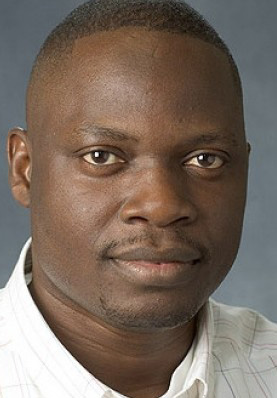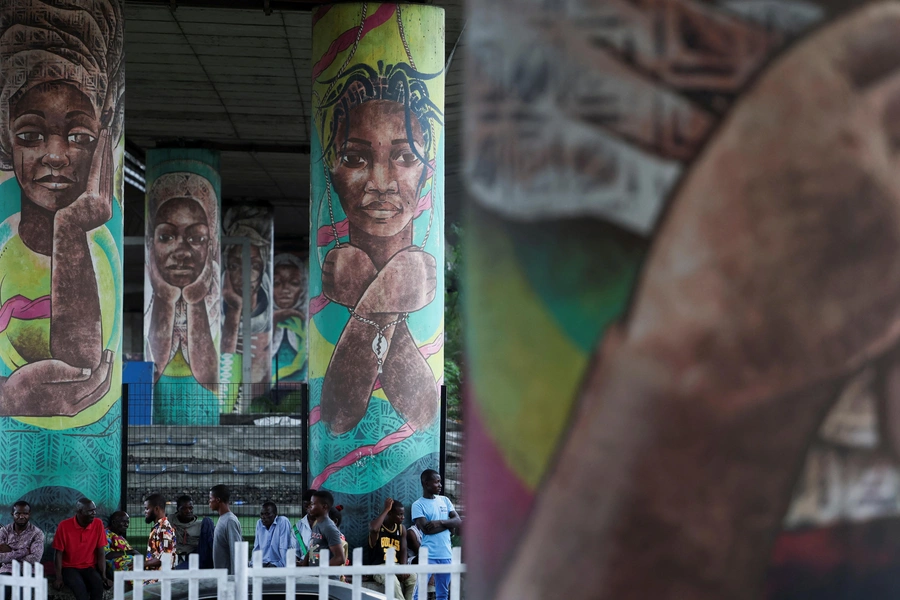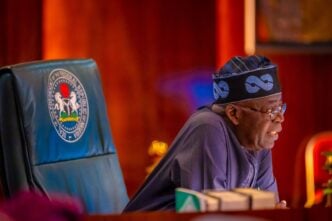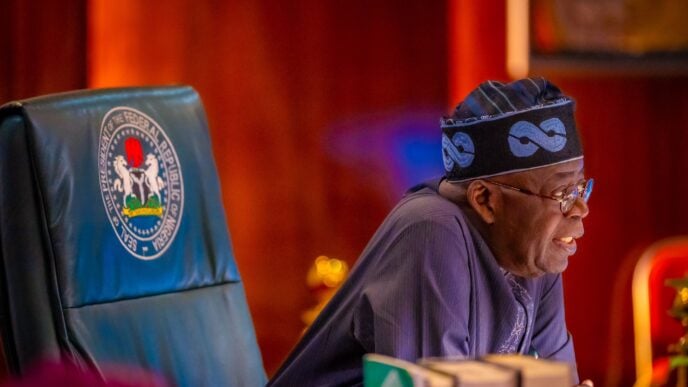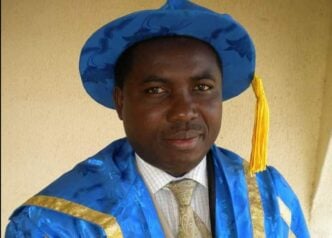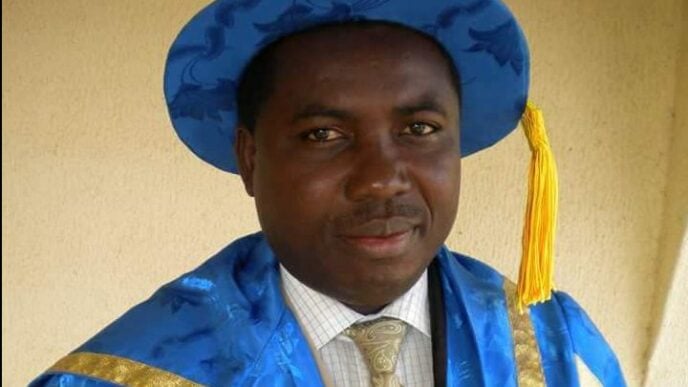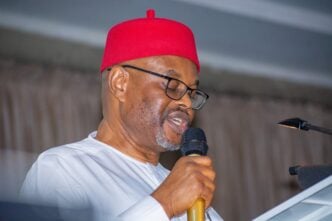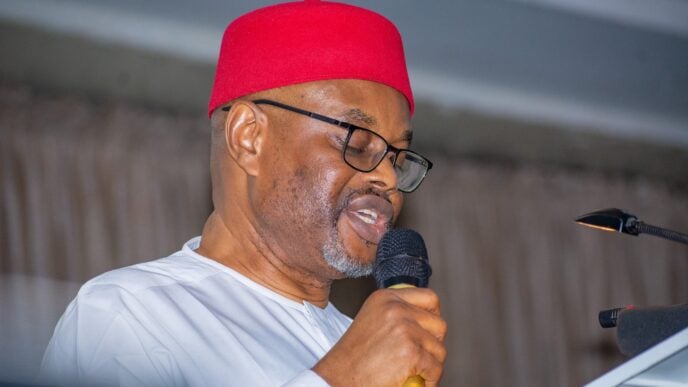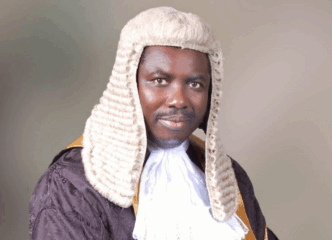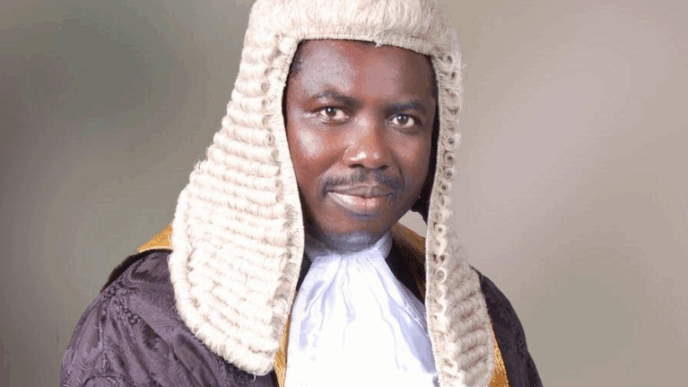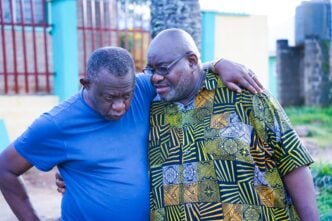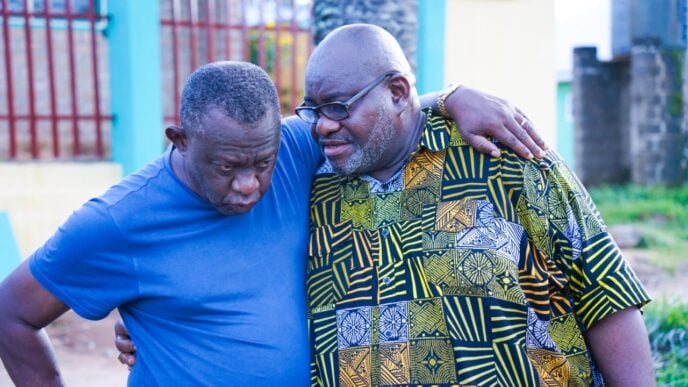People sit under the Falomo Bridge, where murals depicting the abduction of over two hundred Chibok schoolgirls by Boko Haram are displayed, on the day Nigerians mark the eleventh anniversary of the abduction, in Ikoyi, Lagos, Nigeria, on April 14, 2025. Sodiq Adelakun/REUTERS
Within the past week, several senior Nigerian government officials have openly reprimanded the U.S. senator for Texas, Ted Cruz, for posting on his X account that “Officials in Nigeria are ignoring and even facilitating the mass murder of Christians by Islamist Jihadists.” The Republican senator, sponsor of a September 9, 2025, bill requiring the U.S. Secretary of State “to designate the Federal Republic of Nigeria as a Country of Particular Concern (CPC)” and impose appropriate sanctions, added that “It’s time to hold those responsible accountable.” The CPC tag is reserved for countries which have engaged in or tolerated “particularly severe violations of religious freedom.”
Deputy Speaker of the Nigerian House of Representatives, Benjamin Kalu, opened the floodgate of remonstration when he described the legislation introduced by Sen. Cruz as “a mischaracterization of Nigeria’s complex security and religious freedom landscape” and “based on incomplete and de-contextualized assessments.” The Chairman of the House Committee on Foreign Affairs, Oluwole Oke, similarly suggested that the Cruz bill is “a deliberate attempt to damage the Nigerian image (sic).” Insisting that “Nigeria is a very tolerant country,” Minister of Information and National Orientation, Mohammed Idris, flatly rejected the suggestion that any “Nigerian officials will willingly, deliberately indulge in the act of siding with violent extremists to target any particular religion” in the country. Presidential spokesperson Bayo Onanuga was less diplomatic, demanding that Sen. Cruz stop his “malicious” and “contrived lies” (sic) against “my country.” Last but not least, Senate President Godswill Akpabio cautioned against framing the crisis of insecurity in the country “along religious lines” since “terrorists and bandits target Nigerians indiscriminately, regardless of faith.”
At issue in the face-off between Sen. Cruz and the aforesaid Nigerian government officials is the two-pronged question of whether, as Sen. Cruz insists, certain Nigerian officials are in cahoots with Boko Haram jihadists (the group was designated an Entity of Particular Concern (EPC) in December 2023), which would make the Nigerian government indirectly responsible for the “mass murder” of Nigerian Christians; and second, how to characterize the current security situation the country: can an insurgency be described as religious when, to all intends and purposes and as various official spokespersons and not a few analysts have pointed out, its victims are Christians, Muslims, and everyone in between? Put differently, if Boko Haram has it in for Christians only, why kill Muslims as well?
As it happens, the accusation that highly placed politicians give moral, if not material, support to Boko Haram is not original to Sen. Cruz. On the contrary, it is a claim that has circulated among ordinary Nigerians and, in one important instance, pushed by no less a personage than a former president. Addressing the congregation at a Remembrance Day church service in January 2012, then-president Goodluck Jonathan lamented that his administration’s efforts to neutralize the Boko Haram threat were being undermined by the presence of Boko sympathizers “in his government and security agencies.” Said Jonathan: “Some of them are in the executive arm of government, some of them are in the parliamentary/legislative arm of government, while some of them are even in the judiciary”. Furthermore, “Some are also in the armed forces, the police and other security agencies.” If Sen. Cruz is guilty of anything, it is reading back to the Nigerian government an accusation that originated within Nigeria, and one that top Nigerian functionaries themselves once endorsed as the truth.
Advertisement
The same is true of the idea that Boko Haram is motivated by ethno-religious animus. Reacting to a wave of attacks believed to have been instigated by the group in 2012, Pastor Ayo Oritsejafor, president of the Christian Association of Nigeria at the time, insisted that the pattern of the killings suggested “systematic ethnic and religious cleansing.” More recently, in May 2019, former president Olusegun Obasanjo made the following declaration about the Boko Haram insurgency: “It is no longer an issue of lack of education and lack of employment for our youths in Nigeria which it began as, it is now West African Fulanization, African Islamization, and global organized crimes of human trafficking, money laundering, drug trafficking, gun trafficking, illegal mining, and regime change.” The former president was promptly criticized by spokespersons for the then-Muhammadu Buhari administration for “imputing ethno-religious motive to Boko Haram and ISWAP.”
Based on his most recent remarks on the subject, we may safely deduce that the Nigerian statesman no longer believes what he believed back then. Speaking at a public event earlier this month, Mr. Obasanjo indicated as much: “I found, yes, there was Boko Haram. I found they were not really aiming for anything political or anything seriously religious. But in short, they were looking for a better life. And any other thing attached to that is a better life for them.” While it is important to note that the former president has had a change of heart in regard to the origins and motives of Boko Haram, the key takeaway, once again, is that his epiphany is recent. If anything, outside elite circles, Sen. Cruz’s suggestion that the atrocities of Boko Haram are directly targeted at Christians remains popular. True, the popularity does not prove anything, but it at least shows that Sen. Cruz’s opinion is not a fringe one.
Which leaves us with the question of how to characterize the insurgency itself: Is it religious or not, and what does it mean for an armed rebellion to be “religious”?
Advertisement
Mr. Obasanjo has suggested that, rather than being guided by a religious motive, Boko Haram terrorists want nothing more than “a better life.” In other words, Boko Haram is, as he now sees it, “driven by poverty, not politics.” Other commentators agree. For example, in rejecting the idea that Christians are being singled out for persecution, political scientist Jibrin Ibrahim has sought to draw attention to “the challenges of inter-communal violence in Nigeria”; “the growing sense of injustice in the country from virtually all quarters”; and “the massive growth of poverty… over the past decade,” making “peace building a very difficult enterprise.”
These arguments amount to nothing more than an attempt to explain away the atrocities of Boko Haram, to establish a false equivalence between Boko Haram and other instances of armed rebellion against the Nigerian state, and lastly, to attribute to the group political objectives that it has explicitly disavowed at every opportunity.
Now, given the level of poverty across northern Nigeria (according to the World Bank’s latest Nigeria Development Update report [PDF], “Poverty remains elevated in the north, where more than 7 in 10 Nigerians are poor, compared to about 3 in 10 in the south. The northeast zone has the highest incidence of over 80 percent, compared to 32 percent in the south-south.”), one should not be surprised to find economic malcontents within the rank and file of Boko Haram.
But that in no way justifies the lazy conclusion that Boko Haram is a product of poverty. Boko Haram is not interested in economic reform. If it were, we would not have to guess. Whenever its leaders have had the chance, they have made it abundantly clear that their project is religious and religious only. What Boko Haram seeks is the abolition of the Nigerian state and its replacement with a Sharia-based theocracy. Those, like Ibrahim, who advocate “building a more inclusive state” as a way to tackle jihadism in northern Nigeria appear not to have been paying attention. Boko Haram does not seek inclusion; what it wants is a religiously exclusive state.
Advertisement
If that is the case, why does Boko Haram also target Muslims? The answer is simple: from Boko Haram’s perspective, there is no difference between mainstream Muslims and Christians: they are all “polytheists” who suffer from a common affliction [PDF]: “unbelief.” In other words, Boko Haram indiscriminately targets Christians and Muslims and destroys churches as well as mosques for the same religious reason.
In any event, it is puzzling that all of the government officials or commentators who have trooped out to challenge Sen. Cruz conveniently skipped over the multiple references in his bill to “Nigerian blasphemy laws,” specifically “provisions in Nigeria’s criminal, penal, or Shari’a codes that criminalize expression, behavior, or belief perceived as insulting religion.” The failure to address this extends the pattern of ignoble silence on blasphemy violence in northern Nigeria, a political act that, I have argued, “operates more or less as a license to kill.” It is disheartening to watch the same people who have bitten their collective tongue as mobs have descended on innocent citizens accused of blasphemy promptly jump on an American senator for merely repeating claims that Nigerian leaders themselves have made and seeking justice for victims of jihadist violence.
According to a UN Development Program (UNDP) estimate, the Boko Haram insurgency had killed claimed 350,000 lives by 2021. In his new book on the group, former Chief of Defense Staff Lucky Irabor claims that “no fewer than 2,700 officers and soldiers were killed over 12 years in the battle against Boko Haram.” Insisting, in the face of these grim statistics, that “We have religious harmony in Nigeria,” as presidential spokesperson Bayo Onanuga does, is not only downright insensitive—it is insulting to the memory of Boko Haram’s victims, civilian, and military.
Nigeria’s insecurity crisis cannot be effectively confronted without the necessary clarity about the ultimate aims of Boko Haram. Unfortunately, the manner of the reaction to Sen. Cruz shows that, two decades on, the Nigerian elite is not ready to face the truth about this barbaric group.
Advertisement
This article was first published by Council on Foreign Relations.
Advertisement
Views expressed by contributors are strictly personal and not of TheCable.
